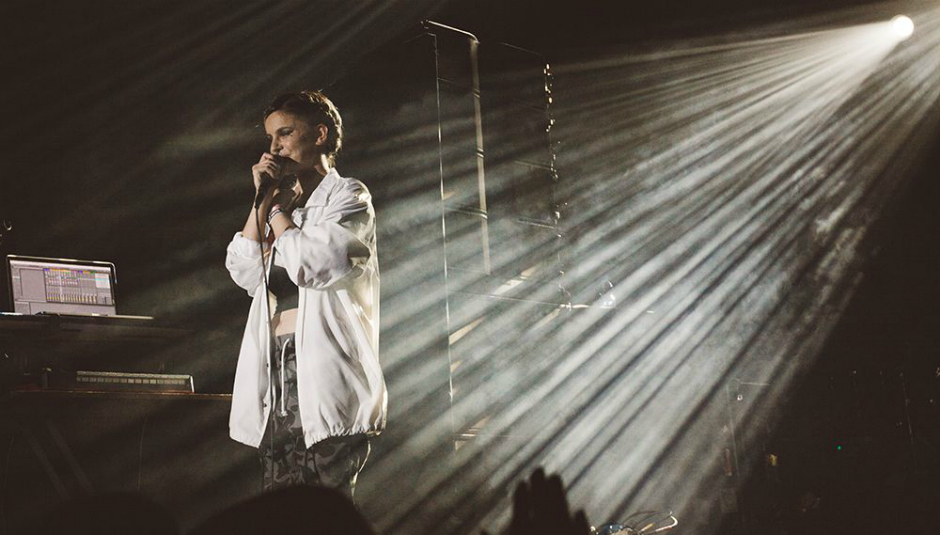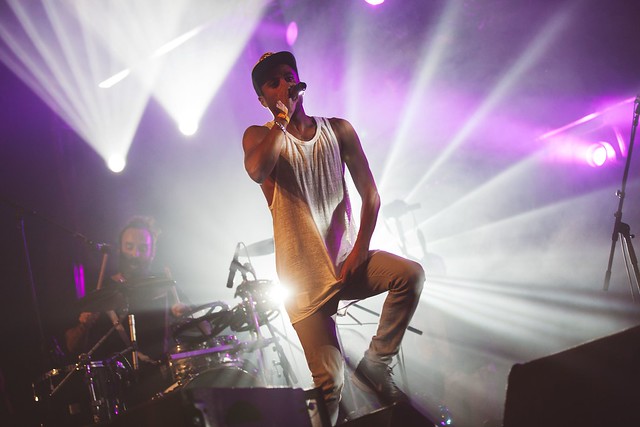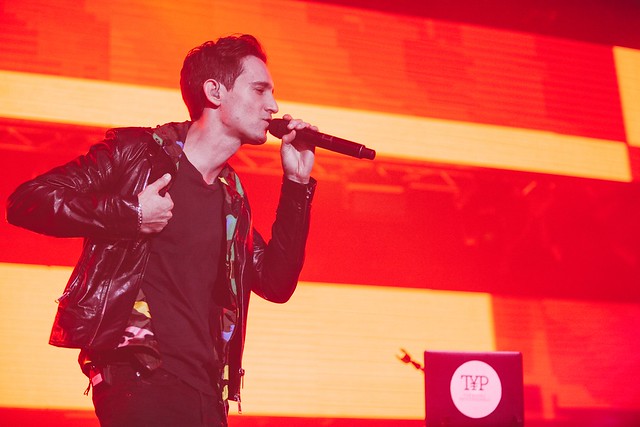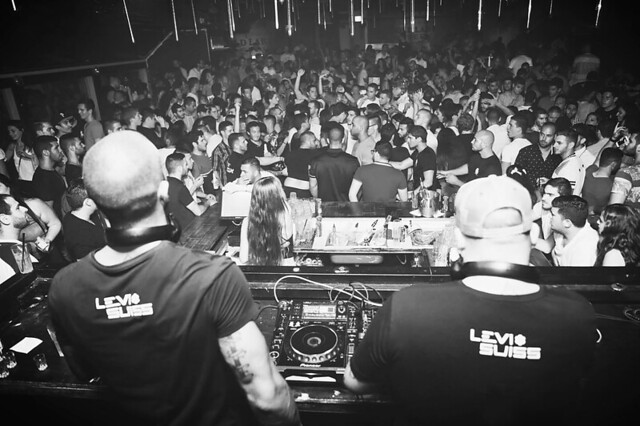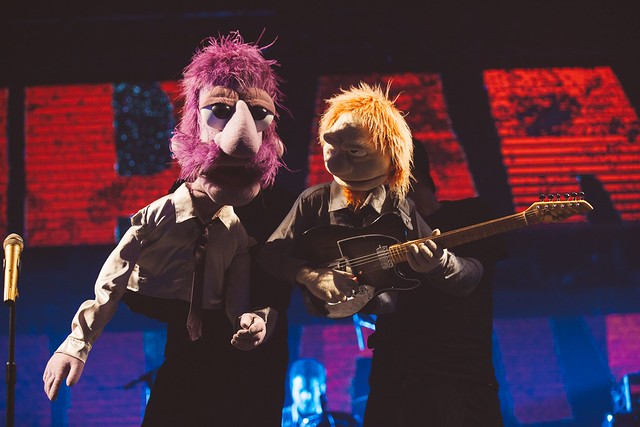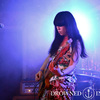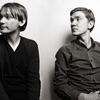It takes precisely thirty seconds to learn just how differently they do things in Israel. I’m greeted directly off the plane by Shia, my “handler”. “I’m here to help you get through security,” he says cheerfully. For whose benefit this is, isn’t really made clear. He has the unfazed look and laconic stride of a man not easily surprised or shocked; perhaps working in one of the most heavily guarded airports in the world has that effect. We wander off, past groups of Hassidic Jews, old men wearing Kippahs and heavily armed soldiers, as the early afternoon sun gathers in warm pools on the polished stone floors.
“So,” I ask, attempting small talk as we stroll along, “ever greeted anyone famous?”
“Occasionally” he replies. “I met Jean Claude Van Damme once. He was really nice. He gave me his cell number as I had to meet his girlfriend later that day. Also Tony Blair. He’s here a lot actually.”
I make a joke about Blair probably not flying economy, but Shia interrupts me. “You know, I think I’m seeing him later today”. He pulls a crumpled sheet of paper from his pocket; it’s a passenger manifest, covered in scrawls of biro and neon orange highlighter. “Yeah, see? 4.20pm. Private plane. Doesn’t say where from.” I follow his finger and read the name; ‘Anthony Charles Blair, UK citizen.’ He smiles and shrugs, just another average day at Ben Gurion international. Welcome to Israel.
I’m here for Tune In Tel Aviv, a four-day event designed to showcase the best of Israel’s burgeoning music scene. It’s as much an industry event as it is a festival in the traditional sense, but there’s still plenty of entertainment on offer; nine venues, a conference day, numerous trips, and over eighty artists hand-picked to represent the talent the country is keen to export. There are a few other journalists present, but most of the invitees are drawn from the business side of the music world; promotors, festival bookers, entrepreneurs. A concerted effort is underway to reach beyond the country’s borders, something that traditionally has never happened. “Most Israeli artists only ever wanted to be big here, and didn’t care about other countries,” says Boaz Sachs, the festival PR who’s been assigned to guide me around. “That’s changing though; they want to go to London now, and the US. Basically be more international.”
A jovial, wise-cracking type with a neat line in dry, sarcastic humour, Sachs has done just about every job in the music world there is to do; PR, label manager, roadie, festival organizer, driver. Along with his colleague Ido Paz, he serves as a constant companion and fixer for the duration of my stay. When we meet on the first night, he’s already stressed; phone glued to his ear, he’s trying to check that everyone has made it to the right hotel, locate an artist, and organise taxis for seemingly the whole festival. One arrives for us, and we pile in alongside Ryan Spaulding, a music writer and promoter from Boston. He’s here with his Outlaw Roadshow, a curated event designed to foster stronger relations between artists and fans that he runs alongside Counting Crows’ Adam Duritz, and he’s hosting six bands tonight.
We weave in and out of rush hour traffic. Driving here is not seat-of-your-pants scary, but nor is it entirely calming; the use of horns is as widespread as the lack of indicating. The city itself is a curious mix, East-meets-West-meets-Old World charm. Hipster bars and pop-up restaurants sit next to spit and sawdust shawarma joints and dilapidated buildings. A new metro line is under construction, meaning half the centre is dominated by boarded off construction pits and cranes sprouting between the downtown towers. It’s busy, but there’s a relaxed vibe to the crowds; young, well-dressed urbanites happily mingle with traditional families and men in thawbs. Dusk is giving way to night, the pavements and roadside terraces now lit by rainbows of neon and the warm glow spilling out from windows and canopies.
Tonight’s venue, The Zone, sits in a quieter residential area some ways from the hubbub. The incongruous entrance would be easy to miss; from the front, it looks like a temporary shack, hastily erected on a patch of scrap ground. Inside though is a different story; vintage sofas and neat rows of chairs dominate the floor in front of the stage, while down the side a long bar is laden with drinks and snacks. It’s a “Media Mixer” too, which means stilted small talk and much swapping of business cards until the alcohol loosens everyone up. Before the music there’s a short Q&A with some of the featured acts, and a few introductory speeches; some polite inquiries are lobbed up to the assembled musicians, and they’re gently paddled back. Seymour Stein is in attendance, and he delivers an inspiring monologue on the universality of music and it’s unique ability to bring disparate people together; a profound thought, given our host country.
We watch the first two acts; Dani Dorchin, a one-man band who’s a cross between a young Seasick Steve and The Black Keys, and Sawyer, who specialise in a sun-baked, rootsy Americana, all slide guitar and good-time harmonica. It’s all very honest and sincere, if a little lacking in originality, and Spaulding is an enthusiastic host, rousing cheers and applause before and after each act. We pile back into cars because there’s an act playing across town that Sachs insist I catch; Tzlil Danin, a singer who gained a certain amount of fame fronting one of Israel’s most popular pop-rock groups. Creatively uninspired, she gave it all up and set out on her own, determined to make something decidedly more modern and a little edgier. The venue, Kula Alma, is a shabby chic playground for the underground hipster set, not entirely dissimilar to Hackney’s The Dolphin. There’s a pizza bar, small art gallery, three bars, a stage, and a PlayStation corner. Oh, and pop-up vintage clothes shop.
It’s packed, and we arrive just as Tzlil takes the stage. She is spectacular. With a voice that’s soft yet deceptively powerful, she moves through crisp electro-pop and smoky, synth-heavy jams; think Lana Del Rey fronting a blissed out Chvrches, and you’re halfway there. The short set is rapturously received, and rightly so; afterwards, as everyone gets back to eating pizza and drinking the venue’s potent, signature cocktail, we have a chat. She tells me how excited she is by the project, and how fulfilling it is. Plans are being made to hit New York and the UK, and she hopes it will be well received; play like that I tell her, and I’m sure you will be. With more shows lined up later in the week, she heads off to protect her voice – smoking inside is perfectly legal here – as the DJ’s start blaring out some upbeat house and dance music. The night moves up a gear, and the dancing gets rowdy.
The trip isn’t all late night showcases and the hard sell of musical exposure. Israel, despite being relatively small in size, is surprisingly diverse geographically speaking, and there’s much to see; the temperate Mediterranean climate of Tel Aviv, arid deserts and the Dead Sea in the south, even skiing in the northern tip, on Mount Hermon. As such, the organisers put together comprehensive day programs of various excursions to give attendees a wider perspective of the country and the culture, and so on day two I find myself in the back of Paz’s car, alongside Sachs and John Kastner, Head of Programming for Canadian Music Week. A veteran of the Montreal hardcore scene, he’s been a member of numerous cult bands over the years – The Asexuals, Doughboys, All Systems Go!, Bran Van 3000 – and is now a noted movie and TV soundtrack writer. Softly spoken and with long dreadlocks, he exudes a typical middle-aged, indie-stoner LA calm, the perfect temperament for what lies ahead.
We’re heading to Jerusalem for the day, a contentious destination given the recent flare-ups and attacks that have plagued the city. As we speed south-east along Highway 1, up and over Ben Shemen, through the Ayalon Valley, and ascending past Sha’ar HaGai and the Castel National Park, the talk is of our plans, and whether it’s safe enough to visit the Old City. Sachs and Paz are sceptical, and obviously don’t want to take risks; Kastner and I argue nothing ventured, nothing gained, and having come all this way, want to see the sights. As the city hovers into view on the plateau ahead, we agree to discuss it more over lunch; a more pressing concern is Kastner’s Soundcloud account and 4G signal, as he’s trying to play us the new Fat White Family single he’s been working on. ‘Whitest Boy on the Beach’ sporadically erupts through the speakers as we cross the city limits and look for a parking space.
Jerusalem is a city of contrasts, of turbulence, and an uneasy tension bubbling away under the surface. A capital claimed by two countries and considered holy to three major religions, it is one of the oldest, and most fought over, cities in the world. But none of that is instantly visible today; it’s calm and sunny, warm too, with locals buzzing around the market stalls buying vegetables, dates, and fresh pitas. The one incongruous image is that of an Israeli soldier, not yet out of his teens, idly strolling down the street holding the hand of his girlfriend, his Galil rifle swinging freely from his shoulder. We head into the market and make a pit stop at what must be the least obvious location for a hipster coffee stall ever, stuck between kosher butcher shops and wholesale nut vendors. The flat whites are delicious, and I notice that one of the other customers, an Arab man of about sixty-five dressed in a keffiyeh and a traditional, full-length qamis, is sporting an Apple watch with a pristine white leather strap.
We eat at Machneyuda, an acclaimed new restaurant whose stock in trade is inventive re-interpretations of classic Middle Eastern fare, where we continue our debate. Kastner and I push for a walking tour of the main sights; Sachs and Paz relent and, somewhat reluctantly, agree. Sated after a two-hour lunch, we head off towards the walled Old City. The first thing we notice is how relatively quiet it is; there are a few tour groups doing the rounds, but no massed hordes of camera-wielding tourists. What there is, however, almost on every corner, are groups of very heavily armed police and army units. Numbering five or six every time, they have the nervous expressions of men who’ve been on edge too long, fingers poised over the trigger of their assault rifles, eyes constantly scanning for trouble. It’s reassuring and disconcerting at the same time; they’re here to protect, but in the event of a firefight it would be hard to find cover.
We navigate the narrow, cobbled streets until we arrive at the Church of the Holy Sepulchre. From the outside, it’s as charming and quaint as many other ancient seats of worship dotted in Old Towns the world over. Inside, the air changes; it feels…rarefied. Groups of old women are busy praying and rubbing garments on the Stone of Anointing just inside the main door, while others bustle in and out of the many chapels assigned to the various denominations who recognise this place as the centre of their religious world. We wander round, past the long queue waiting patiently to view Jesus’ empty tomb, and linger at the Altar of the Crucifixion and the Catholicon. It’s a solemn place, heavy with the weight of history; it’s hard to comprehend just how much humanity’s past, and the modern world, has been shaped and influenced by events which allegedly took place within these very walls. A little awed, We head back out into the late afternoon sun and walk down the hill towards the Western Wall.
The holiest place in the city where Jews are permitted to pray, it can only be accessed after passing through some airport-style security. The sanctity of the Wall decrees that certain customs be observed, even by non-believers; beyond a certain point, the use of phones and electronic devices is severely frowned upon, and heads must also be “covered” – there’s a large box full of lightweight Kipa’s for this very purpose. I’m also told that one should not turn one’s back to the wall either out of respect, but that as a non-Jew, this rule doesn’t really apply to me. At the wall itself, men are busy reciting prayers and scripture, some are writing prayer notes, to be placed within the cracks, and others are, well, wailing. A few groups of children are being lectured in a scholarly fashion; they listen attentively, nodding their understanding. I scribble my “prayer” on the piece of paper that was thrust into my hand when I picked up a Kipa, fold it up, and add it to the Wall. I’m still waiting for it to be answered.
We exit the plaza to the south, catching a glimpse of the Al-Aqsa mosque and the golden Dome of the Rock that sits next to it, shimmering in the late afternoon sunlight. As we skirt the ancient walls of the Old City, you can look out over the neighbourhoods clinging to hillsides to Jordan, the desert, and the Dead Sea; it’s a thought-provoking vista, about this city of contrasts and discord, and the dogmatic struggles of the nearly one million people who call it home. Heading west, we pass the Zion Gate, stroll through the Armenian Quarter, and stop to admire the Tower of David. The sterile opulence of the Mamilla Mall, where we parked, is suddenly jarring; Old World and New colliding, consumerist capitalism a new God to worship at the weekends. We grab some coffees to go, and pile into the car; a long night of music awaits.
Thursday night is billed as the “main event”, and the festival has taken over the cavernous Hangar 11 for the evening, a somewhat soulless, generic club space in the recently revamped Tel Aviv Port area. There are six acts scheduled to play, along with numerous DJ’s and some ear-bleedingly loud between-set playback. The music on offer is pretty diverse: there’s Red Band, a rock band fronted by foam puppets who do raucous, sing-a-long cover versions of classic hits (think Tenacious D meets The Muppets), and T.Y.P., a bright, sparkly electro-pop duo who’re also known for their lucrative sideline in remixing and covering various international DJ’s and stars. It’s very slick and well put together, if a little too “X Factor final”; their cover of Lana del Rey’s ‘Video Games’ in particular smacks of trying way too hard.
Far better are Balkan Beat Box, who deal in a madcap Mediterranean mix of Gypsy punk, reggae, electronica, and hip-hop. You may not know them, but you’ve almost certainly heard their music; the sax sample at the heart of Jason Derulo’s ‘Talk Dirty’ is lifted directly from the band’s 2007 song ‘Hermetico’. It’s a barnstorming show, and easy to see why they top the bill; the sheer energy they bring to the stage is impossible to resist. But discovery of the night is producer and lyricist Adi Ulmansky, a talent who seems ready-made to succeed beyond Israel’s borders. Perched on the left of the stage, with just a few samplers, keyboards, and a laptop for company, she attacks her set with no fear. The obvious comparison for what she does would be Grimes, but there’s far more trap and hip-hop blended into her icy electro-pop, and a little more edge. It might lack the manic fizz of Claire Boucher’s best work, but no matter; when she hits her groove, alternately spitting rhymes or singing sweetly, she’s utterly captivating.
With the music done, and the drinks tokens used up, we’re ushered towards a fleet of cabs for a ride across town to Noho, and the “Official Opening Night After Party Rave”. The club is seemingly so exclusive that our driver can’t find it, and drops us two blocks away; the distant thump thump thump of the music guides us to our destination like a homing beacon. As a venue, it’s nice enough, a well-decked out dancing sweatbox with a blinding lighting system and posh (i.e. expensive) booze brands. Most of the DJ’s play a generic mix of high energy EDM and euro-dance, full of drops and gut-bothering bass, which keeps the crowd in permanent hands-in-the-air mode. The one standout is Levi & Suiss, a duo that has a somewhat more cerebral take on late-night knob-twiddling. For a start, it’s not common to build dancefloor bangers around melodies lifted from a Beethoven sonata, nor is it de rigueur to add Arabic and Eastern influences to the sort of wide-screen stadium EDM that’s normally accompanied by million-watt laser shows and crowd surfing on a dinghy. Shlomi Levi, the elder statesman, who once spent two years as Manchester United FC’s official DJ – no, really – mainly handles the technical side while Aaron Suissa brings the charisma and works the crowd; it’s genuinely fun in a way this music rarely is. In our private booth, people stand on the leather sofas or head out to lose themselves in the melee, while staff keep bringing over bottles of vodka on ice. The dancing, by this stage, is beyond rowdy.
Friday night brings with it choices; six venues, six distinct line-ups. There’s “Hip Hop In The Holyland” presented by Noisey UK, a metal night at one of the city’s scuzziest venues, plus takeovers by both Canadian Music Week and CMJ Music Marathon. The best idea is probably to stick to just one flavour, but as there are several acts I’m keen to see, I hatch a plan involving some precision timing, lots of power walking, and heavy use of Google maps. Sachs calls to tell me he’s on his way over in a cab; while I wait, I join Spaulding at the hotel bar where he’s getting well acquainted with their whisky selection.
Our first stop of the evening is Kuli Alma again, and a date with Noa May. A human rights lawyer by day, May’s music swings between hushed acoustics and jazz-infused stompers, a swirling mix that borrows from PJ Harvey, St. Vincent, and Gil Scott Heron. It’s the sort of intelligent, thought-provoking indie – especially the lyrics – that can be easy to admire but hard to love; May’s greatest skill is making it every bit as enjoyable as it is worthy, stimulating the limbs as much as the brain. I leave just before the end to leave time for the six block walk to Café Bialik to catch Tetish, a band who’ve already gained a certain amount of international recognition. Having played both Canadian Music Week and New York’s CMJ in 2015, they’re considered one of the scenes’ more successful acts; after just a few songs, it’s not hard to see why. Their music has an easy charm and an instant appeal, a sort of lounge-y inspired take on rock, folk, and electronica-lite. It’s neat and unfussy in a classy way, leaning on quality songwriting as opposed to flashy gimmicks or tricks, with Etan Salomon’s voice the key element; she can switch from hushed introspection to power ballad in the blink of an eye, and knows exactly when to do so. Best of all is ‘I Don’t Mind’, a slinky, sultry number that has a little soul, and a little funk, mixed in with the femme fatale overtones.
As soon as they’re done, we’re off again on another brisk walk, this time to Levontin 7 and Lara Snow, another act that I’ve been told not to miss. Together with regular collaborator Jonatan Harpak, she whips up a blitzkrieg blast of sample-heavy pop, rap, dance, and electronica, a sensory overload that scorches the eyes as much as the ears. They practice a kind of sonic maximalism, cherry picking from anything and everything that interests them; as part of a generation who grew up with easy access to pretty much all recorded output ever, it’s only natural that their music should have a certain magpie quality. Snow herself has a magnetic presence and natural charisma, an easy way with the crowd that has us all captivated; at one point she casually strolls through the audience while delivering a song, by turns singing and losing herself in dance. Afterwards, she tells me that their next ambition is to tour Europe, and hit the States again; on this form, they’re sure to find an enthusiastic audience willing to embrace them.
The festival’s last night, despite being a Saturday, is somewhat subdued; unsurprisingly, three days of late nights and early rises have started to take their toll on the delegates. After a restorative day floating in the Dead Sea and exploring the ancient ruins of Masada, we reconvene at Bascula, a newish club and arts space in the heart of the city. We arrive early – too early – and many cokes and mineral waters are ordered. A few of the festival staff join us, finally able to relax a little after several days of stress; Sachs and Paz are in high spirits, and Jeremy Hulsh, the festival’s mastermind, looks exhausted but elated. There are six bands scheduled, and it’s the most eclectic line-up yet; “something for everyone” doesn’t quite explain just how different they all are.
There’s sweet, acoustic folk-rock and balladeering from Russo & Weinberg, psychedelic heavy rock and riffs-a-plenty from Ouzo Bazooka, and Jane Bordeaux who, according to their website, play “Americana Hebrew Folk Country Music”. Sandwiched in-between that lot are Panic Ensemble, a theatrical cabaret ensemble whose lyrics are written by noted Israeli poet and academic Karen Alkaley Gut, and Los Caparos, a five-piece man band who seem to have taken as much inspiration from Madness as the Beatles. But really, everyone is here to see Ninet, who has the duel honour of sitting atop tonight’s bill and closing the festival as a whole.
Described on her Wikipedia page as “the most famous person in the Israeli entertainment business”, she’s a former winner of Israeli Idol and an acclaimed actress; she’s also worked with and performed alongside a range of international stars from Cyndi Lauper to The Jesus And Mary Chain. We only get to hear four songs before the police turn up and unceremoniously shut the party down, but she’s a revelation; best of all is her slowed-down take on Gnarls Barkley’s 'Crazy', a version she originally recorded with those crazy puppets, Red Band. The sense of disappointment in the air is palpable, not just for the end of the party, but the sense of missing out on an artist just hitting her stride. We talk after, and she tells me as well as a new album to be released, 2016 will be her assault on America with her own headline tour, and appearances at SXSW. She was due to play some new material tonight too, and is as downcast about the early denouement as the rest of us. We drift off to another bar, Rothschild, which has also doubled as a venue this week, and have the last few drinks. Someone starts DJ-ing upbeat party music, but everyone looks pretty beat; the dancing, for the first time, fails to get rowdy.

